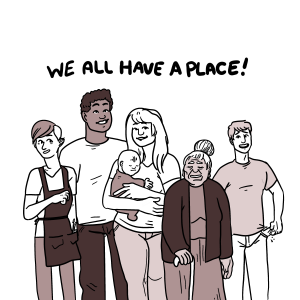Aaron Thompson, the new president of the Council of Postsecondary Education, spoke to the Murray State community Tuesday evening on his Listening Tour.
Thompson’s Listening Tour is a statewide tour of Kentucky universities in which he asks the community, faculty, and students what they would like to see change in their school. Focusing on topics like affordability, diversity (or “equity,” as Thompson likes to put it), enrollment and graduation percentage, the president is gauging the community’s response and putting it into his plans.
What were the responses, though? And what did he seem to think of them? And what did the community ask of him?
The community presented far more than he could have hoped for, and whether or not that turned out to be any good for him is still yet to be seen. Some were pleased with his answers to their questions, some thought his suggestions weren’t quite to their liking.
Financially, Thompson doesn’t seem to have a plan. Tuition continues to skyrocket, many students in attendance were sure to point this out to the new president, questioning how he planned on combating the issue. He stressed that bringing affordability back into the picture was at the top of his list, making college an option for low-income students is most certainly a priority.
He just doesn’t seem to have a plan for it quite yet.
Tuition is a hard problem to tackle. Not only tuition, but the costs of room and board, books and any other equipment a student may need are daunting all on their own. Maintenance costs for campus are a terror for any university, as well.
It’s understandable that affordability in general is difficult to plan for, but don’t talk big when you aren’t positive you’re going to be able to make any positive change yet.
The former head of the history department, Kevin Wolf, brought up the losses being taken in liberal arts fields like history, performance arts and language for the benefit of STEM programs. Thompson responded with a statement he immediately regretted.
“It’s like cutting off a limb so the whole body can be healthy,” he said, right away calling it a bad analogy.
Thompson tried to save himself by going on to say that he doesn’t play the “either, or” game. He acknowledged that people need to understand that while it may not be important for everyone to get a four-year degree, it is important to teach them about writing, art and other such things.
The way he spoke of it, he seemed to think that degrees not dealing with STEM were never four-year degrees. He certainly knows that they are, but his statements on the matter were heavily pro-STEM. It was almost like he was a pre-medical student asking an arts major where they were ever going to find a job with their degree.
STEM is important, there is no question about it, but its growth at the expense of cultural programs is growth that should not happen. Learning to be creative, to write and to understand the past is necessary. Just as learning to develop potentially life-saving medicine, engineering protective equipment and thinking up new algorithms is necessary, also.
Despite these hot topics, perhaps the hardest hitting concept of the night was racism on campus.

“It is time to talk about racism,” Blakely Broder, a junior and Presidential Fellow, read aloud from a letter she wrote directly to the CPE president.
Thompson read along with her as she bravely described the continuing existence of racism she sees all around her.
“So here I am, the white woman asking for the manager,” she said. “What is less threatening than that?”
She simply asks that people see people as just that, fellow humans making their way through this wild ride we call life.
Thompson wholeheartedly agreed with her, telling the audience about the new diversity policy the CPE has developed. No longer will an online quiz signature be the requirement; schools will be submitting proof of their acceptance and welcome to all races, ethnicities and cultures.
The president thrived in the conversation on race. His suggestions are more than good, they’re potentially revolutionary. Thompson doesn’t want diversity, he wants equity. Minorities are not a number, they are real people seeking an education. A quota should not be the intention.
He is working through these problems, aiming for a college campus with an aura of change, equality and students happy with their decision to pursue a postsecondary education.
Now, he just has to achieve it.